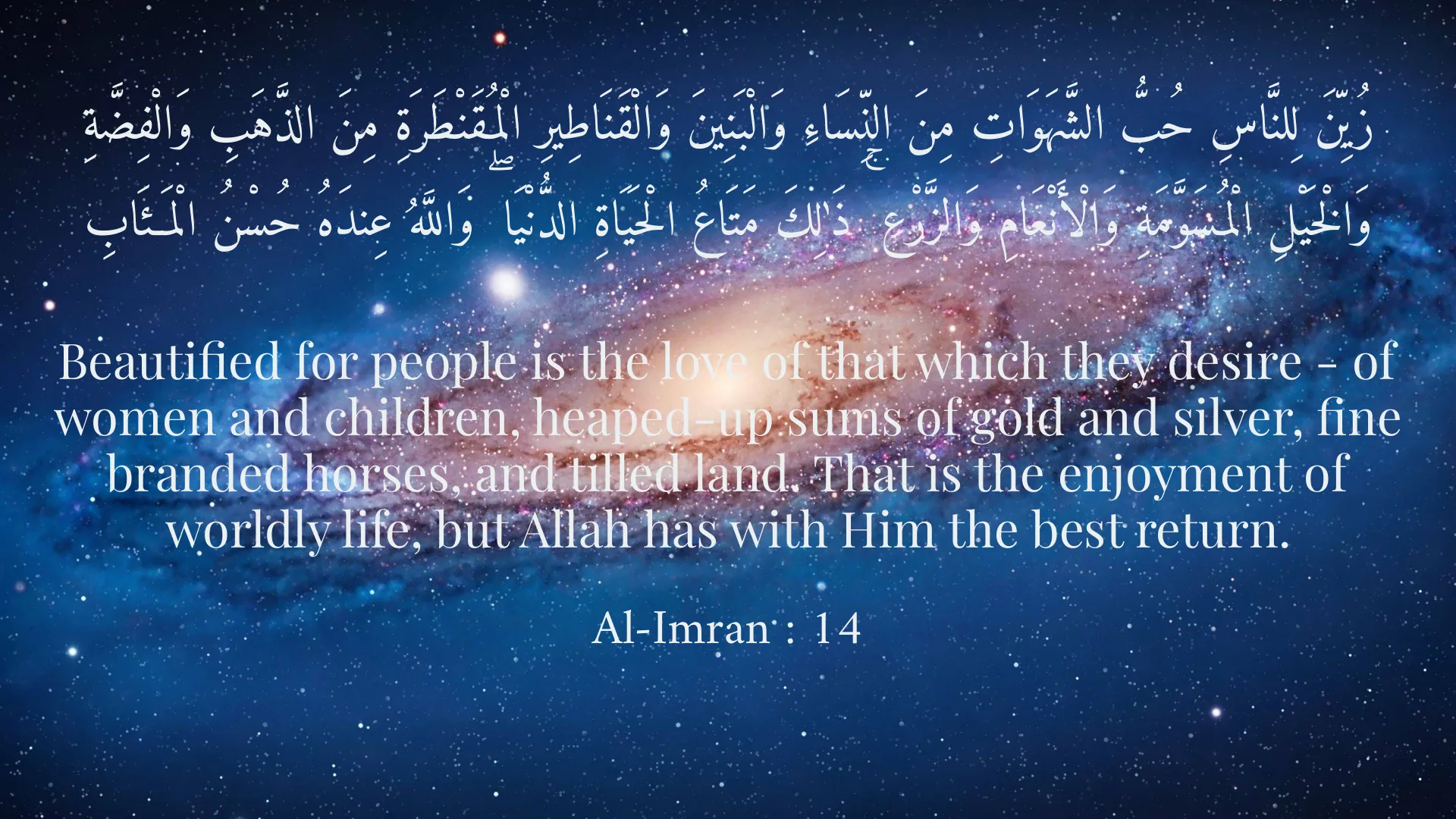Quranic Answer

The Holy Quran serves as a guiding light for millions of believers around the world, offering insights into the nature of existence, the importance of spiritual values, and the transient nature of material possessions. One of the key teachings conveyed in the Holy Quran is the reminder that life is not solely defined by material wealth and worldly decorum. The verses of the Quran highlight the distinction between material gains and spiritual blessings, urging us to seek a higher purpose in our existence. In Surah Al-Imran, verse 14, we are explicitly reminded that the adornments of worldly life—including spouses, children, accumulated wealth, and agricultural products—are merely decorations of this transient existence. These worldly possessions, while they can bring temporary pleasure and comfort, ultimately do not define our worth or our ultimate fate. Instead, we are beckoned to shift our focus toward the afterlife and to the eternal rewards that Allah has prepared for the righteous. This verse serves as a powerful reminder of the impermanence of life and the significance of prioritizing our spiritual well-being over our material pursuits. Furthermore, in Surah An-Nur, verse 45, Allah warns against becoming overly attached to worldly matters. This verse emphasizes that while it is natural to seek success and comfort in our daily lives, we must not allow these pursuits to overshadow our spiritual obligations and moral responsibilities. The true debt of happiness and fulfillment is derived not from the abundance of our material possessions but from the enrichment of our faith and piety. In a world where consumerism often leads to discontent and emptiness, this Quranic directive resonates more than ever, urging us to refocus our aspirations on spiritual development. In Surah Saba, verse 46, Allah further emphasizes the importance of maintaining a healthy perspective on material possessions. He reminds us that excessive reliance on worldly wealth can lead to spiritual deprivation. The underlying message here is that true value is found not in what we own but in our relationship with Allah and our sincere servitude to Him. This perspective fosters an understanding that no matter how much we accumulate in terms of material wealth, it cannot replace the inner peace and tranquility that come from seeking Allah's pleasure. The concept of blessings in Islam transcends mere material success. Genuine blessings arise from a connection with the Divine, creating a sense of fulfillment that material wealth cannot replicate. The satisfaction derived from pleasing Allah cultivates a profound tranquility in the heart, unlike any earthly fortune. When we anchor our lives in faith and spirituality, we discover that the essence of life lies in our ability to forge meaningful relationships with our Creator and one another. This quest for truth and meaning is intrinsic to the human condition, as the soul inherently seeks fulfillment beyond the ephemeral nature of material gains. When we navigate our lives through the lens of spirituality, we inevitably become driven towards good behavior and acts of kindness. The Quran encourages us to recognize the potential of our blessings—to utilize them as tools for helping each other and uplifting our communities. This philosophy aligns with the principles of social responsibility and moral duty emphasized throughout the Quran. Material blessings should not serve as mere tokens of status or privilege; instead, they should be accompanied by spiritual commitment that guides us toward altruism and generosity. Ultimately, true happiness and fulfillment are obtained through our relationship with Allah. The Quran teaches us that real contentment is found in understanding that our worth is measured not by our material achievements but by the goodness within our hearts and our actions towards others. In this light, we must strive to transcend the limitations imposed by societal expectations, redefining success through spiritual growth and moral integrity. In conclusion, the themes present in the Quran speak loudly against the constraints of materialism. It compels us to recognize that life is deeply enriched by our spiritual experiences, urging us to explore the nuances of faith and morality. As we endeavor to cultivate our spiritual lives, let us remember that the true essence of being lies not within the confines of wealth and possessions but within the love, faith, and compassion we harbor in our hearts. Life's ultimate blessings are found in striving for a deeper connection with Allah, pursuing virtuous conduct, and achieving balance in every aspect of our lives. May we all be guided toward a life that honors these teachings, allowing us to experience the beauty of divine blessings beyond material confines.
Related Verses
زُيِّنَ لِلنَّاسِ حُبُّ الشَّهَوَاتِ مِنَ النِّسَاءِ وَالْبَنِينَ وَالْقَنَاطِيرِ الْمُقَنْطَرَةِ مِنَ الذَّهَبِ وَالْفِضَّةِ وَالْخَيْلِ الْمُسَوَّمَةِ وَالْأَنْعَامِ وَالزَّرْعِ ۚ ذَٰلِكَ مَتَاعُ الْحَيَاةِ الدُّنْيَا ۖ وَاللَّهُ عِندَهُ حُسْنُ الْمَـئَابِ
Beautified for people is the love of that which they desire - of women and children, heaped-up sums of gold and silver, fine branded horses, and tilled land. That is the enjoyment of worldly life, but Allah has with Him the best return.
Al-Imran : 14
إِنَّمَا ٱلْمُؤْمِنُونَ ٱلَّذِينَ إِذَا ذُكِرَ ٱللَّهُ وَجِلَتْ قُلُوبُهُمْ وَإِذَا تُلِيَتْ عَلَيْهِمْ آيَـٰتُهُ زَادَتْهُمْ إِيمَــانًا وَعَلَىٰ رَبِّهِمْ يَتَوَكَّلُونَ
The believers are only those who, when Allah is mentioned, their hearts become fearful, and when His verses are recited to them, it increases them in faith; and upon their Lord they rely.
An-Nur : 45
قُلْ إِنَّمَا أَنَا نَذِيرٌ مُّبِينٌ
Say, 'I am only a Warned.'
Saba : 46
Short Story
Once upon a time, there was a man named Adel who lived in a small village. He worked all day and only focused on material possessions. One night, he dreamt of walking in a beautiful garden filled with colorful fruit trees. When he woke up, he wondered why he had only focused on material things. He decided to dedicate himself to prayer, worship, and helping his neighbors. From that day on, instead of worrying about material possessions, he paid more attention to spiritual blessings and found greater peace.